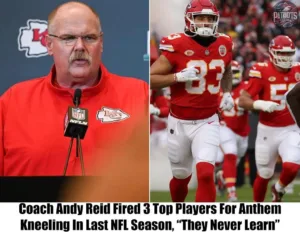
In a stunning turn of events, the National Football League (NFL) found itself thrust into the spotlight of controversy as Coach Andy Reid, guiding the Kansas City Chiefs, took an unyielding stance against anthem kneeling, sparking widespread debates about the intricate intersection of sports and activism. The long-standing ritual of players taking a knee during the national anthem, symbolizing a peaceful protest against racial injustice and systemic inequalities, collided head-on with Reid’s recent decision to terminate three top players, thereby introducing a fresh layer of complexity to the ongoing discourse.
Speaking to the media in a post-game press conference, Reid, visibly resolute, articulated his rationale behind the controversial decision, asserting, “I respect every individual’s right to express themselves, but on my field, we stand united. The national anthem is a moment of unity for our team and our fans. I won’t tolerate any actions that undermine that unity.” This declaration reverberated throughout the NFL community and beyond, igniting a firestorm of reactions across various social media platforms.
The abrupt termination of three key players sent shockwaves through the NFL landscape, eliciting a myriad of responses ranging from staunch support to vehement criticism for Coach Reid’s decision. The move precipitated intense debates, raising fundamental questions about the delicate balance between freedom of expression and the professional expectations placed on athletes within the confines of their respective teams.
As news of their termination proliferated, the affected players took to social media to articulate their perspectives. While some conveyed understanding of the team’s policies, others vehemently decried what they perceived as an infringement on their fundamental right to engage in peaceful protest. This stark divergence in viewpoints served to further fuel the already simmering national conversation surrounding activism in the realm of professional sports.
The public response to Coach Reid’s decision exhibited a palpable polarization, mirroring the broader societal divisions on the contentious issue of anthem kneeling. Supporters lauded the coach for upholding tradition and fostering team unity, while detractors contended that such punitive actions only served to suppress players’ rights to leverage their platform for effecting social change.
Beyond the realm of public opinion, legal experts and commentators weighed in on the potential contractual implications stemming from Coach Reid’s decision. The NFL Players Association, renowned for its steadfast advocacy of players’ rights, promptly announced its intention to conduct a comprehensive review of the terminations to ensure strict adherence to contractual agreements and due process.
The sudden departure of three pivotal players undeniably exerts a significant ripple effect on the Chiefs’ roster and team dynamics. The resultant void left in their wake gives rise to legitimate concerns regarding the team’s future performance and its capacity to effectively adapt to the unforeseen personnel upheaval.
Coach Reid’s decisive action not only thrusts the Kansas City Chiefs into the forefront of national scrutiny but also prompts a broader reevaluation of the NFL’s stance on player activism. As the league grapples with the ongoing complexities inherent in navigating the intersection of sports and social issues, this incident serves to underscore the multifaceted relationship between athletes, coaches, and the evolving expectations imposed by the league.
In summation, Coach Andy Reid’s bold decision to terminate three top players for their involvement in anthem kneeling has indubitably stirred the waters of the NFL, shining a glaring spotlight on the enduring tension between sports and activism. The ramifications of this incident are far-reaching and multifaceted, underscoring the critical juncture at which the league finds itself in defining its stance on matters extending beyond the confines of the gridiron. As the dust settles, the NFL faces a pivotal moment of reckoning in charting its course on issues pertaining to expression, solidarity, and the indispensable role of athletes in catalyzing meaningful social change.